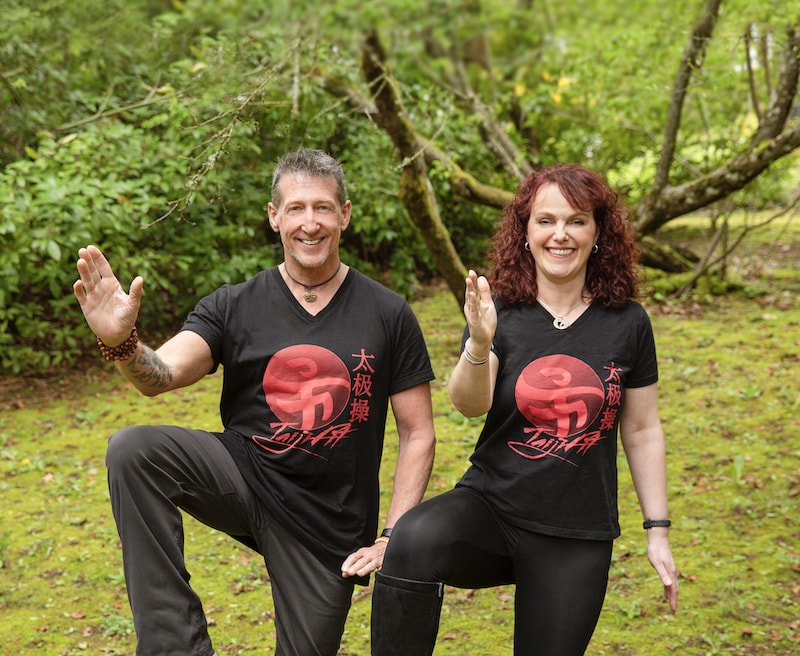When you look at the balance of fitness routines recommended for health and longevity, it turns out that most of them were actually designed for men. They fit men's personalities, muscle structure and physique. Fitness programs for women have often just been watered down men's workouts. But women have different needs when it comes to health and fitness. I regularly teach a tai chi regimen especially for women.
Women, more than men, need a workout that both strengthens the bones and calms the immune system. Women are far more susceptible to autoimmune diseases than men, including multiple sclerosis (MS), arthritis, lupus, fibromyalgia and psoriasis. Women are also more at risk for thinning bones as they get older, at a time they are more likely to fall.
My short follow-along tai chi routine using easy Yang-style movements is a popular daily workout for women interested in maintaining their health. It promotes stress-relief, coordination and strength, supports the immune system, and improves your body awareness and balance.
"There's very strong evidence that tai chi is one of the best weight-bearing exercises to reduce the risk for falls," says Peter Wayne, director of the Osher Center for Integrative Medicine.
One in every four adults over age 65 will experience a fall, and of those falls, one in five will cause a broken bone or head injury, according to the CDC.
"Research has found that people who do tai chi see a 20% to 40% reduction in the risk of falls even after as little as six months," says Wayne.
For example, a 2017 study published in the Journal of the American Geriatrics Society found that older adults who participated in one to three hour-long tai chi sessions each week for up to 26 weeks lowered their fall risk by 43% and cut in half their likelihood of injuring themselves as a result of a fall.
"I've heard my colleagues describe tai chi as a one-stop shopping, multimodal therapy," says Wayne. "Tai chi has many different benefits, and it's gentle. It's quite safe. It can also be a confidence-boosting gateway for people who don't exercise to expand into new forms of exercise."
Weakening muscles. As people age, they lose strength, which can make them less stable and more likely to fall. The weight-bearing nature of tai chi helps to strengthen leg muscles. It also works on improving flexibility, particularly in the ankles, knees, and hips, where it's needed for good balance.
Sensory deficits. Many factors can lessen sensation in parts of the body, and these become more common with age. They include medical conditions such as peripheral neuropathy, a type of nerve damage that causes weakness, tingling, and numbness, most often in the hands and feet. Numbness in the bottom of the feet (what doctors call a loss of plantar sensation) can make it harder to balance. "There are several studies that show tai chi improves plantar sensation," says Wayne. This renewed sensation can help you tell if you are leaning too far forward or back and to make adjustments so you don't lose your balance.
Slower reaction time. Research shows that people who do tai chi regularly can improve their reaction time. In one experiment, as people walked on a treadmill, they were exposed to a small shift underfoot (while wearing harnesses to prevent falls). People who had done tai chi had better muscle reaction times and were less likely to lose their balance from the simulated slip than people who didn't do tai chi, says Wayne. This effect is similar to the way trained baseball players will reflexively raise a hand to catch a ball if it's thrown their way. If someone who regularly does tai chi steps on an uneven curb, for example, she may be less likely to panic and fall because she knows reflexively how to shift her body weight to maintain her balance.
Loss of focus. Another benefit of tai chi is that it can help you learn to focus on the sensations in your body. Researchers have found that people sometimes fall because they become distracted, says Wayne. This effect is demonstrated in experiments when people are asked to stand on one foot and then to count backward by multiples of 7 or 3. People who are asked to do this calculation while balancing typically lose their balance much faster than people who are standing without performing a mental task, says Wayne. This same thing can occur with regular distractions around the house, or if you're worried or upset about something. Tai chi seems to help people mentally focus and more readily shift their attention between tasks. This helps to insulate them from balance-disrupting distractions. "It's teaching you to be aware of multiple things at the same time," says Wayne.
Bone-Building
In addition, there's a possibility that tai chi can even help to make your bones stronger. Some research has found it can prevent some of the bone loss that occurs with age. Around the time of menopause, many women see a steep reduction in bone density due to reductions in the amount of the hormone estrogen circulating in the body. This loss of bone mass can result in a thinning of the bones called osteopenia, and, if it continues, eventually makes your bones brittle and prone to fracture, a condition called osteoporosis. It's possible that tai chi works to slow down the rate of bone loss because it's a weight-bearing exercise, which stimulates bone growth." - Harvard Medical School
Recent evidence shows that far from being only structural, the bones actually generate a master hormone related to whole-body health, but they require regular gentle weight-bearing stimulation in order to function optimally. This new area of research may prove that tai chi is truly the best form of exercise in the world.
The above is an original article by Master-Teacher David-Dorian Ross. He is author of many DVDs including his newest ones published by YMAA Publication Center, Tai Chi Fit: for Women ISBN: 9781594396915, Tai Chi Fit: Healthy Back: Seated Workout, ISBN: 9781594396946, and Tai Chi Fit: Healthy Heart Workout, ISBN: 9781594396922.








